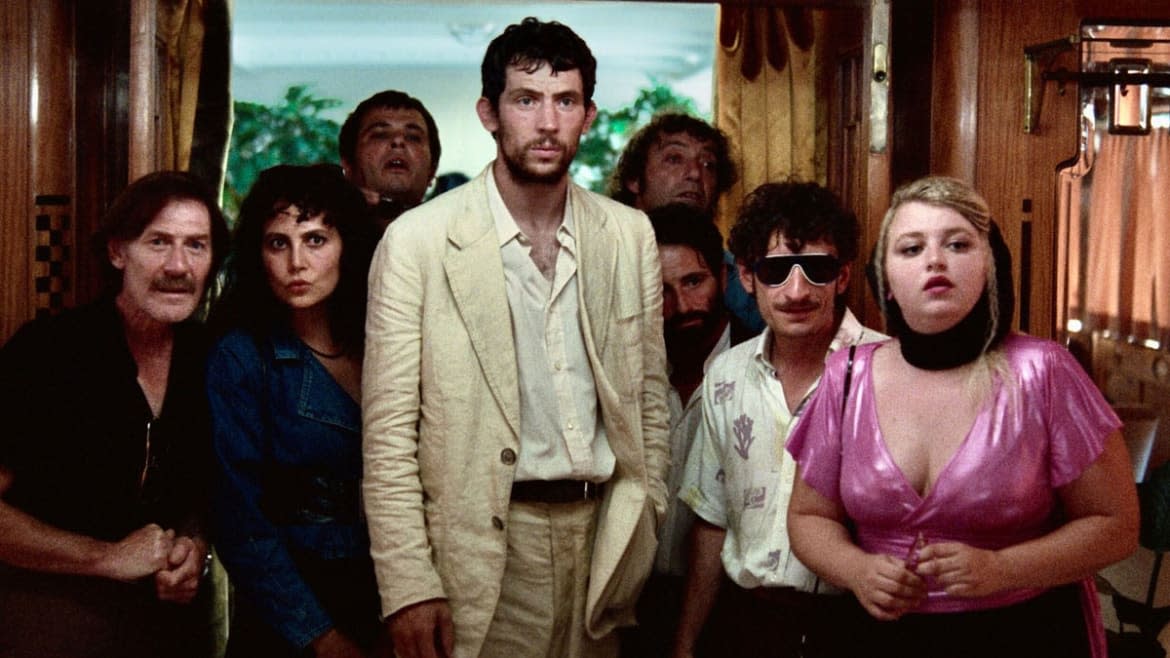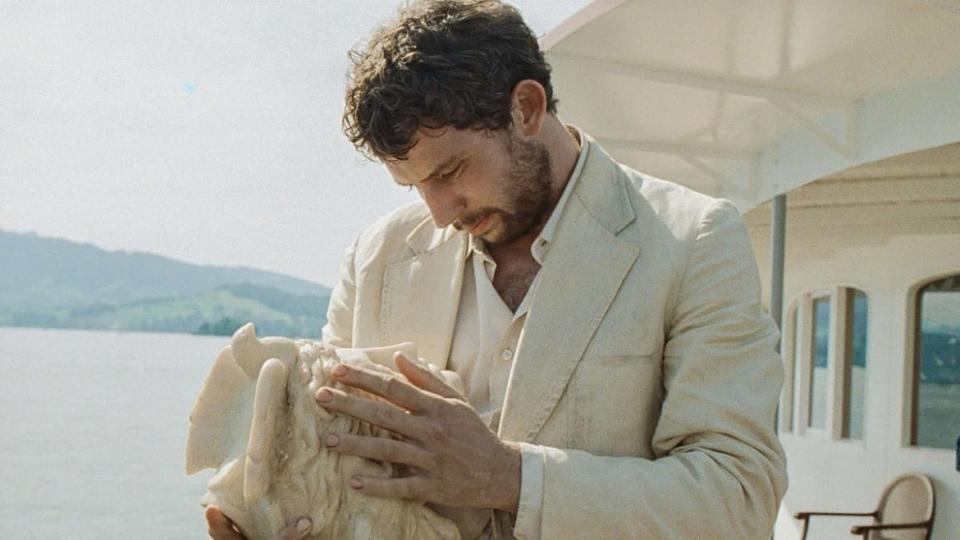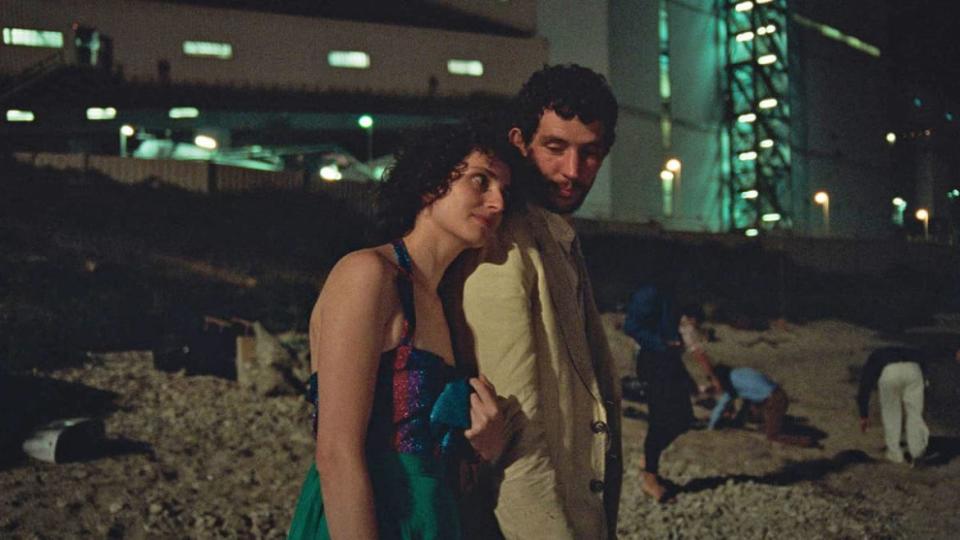Josh O’Connor’s Latest Film Is a Gorgeous Italian Delight

- Oops!Something went wrong.Please try again later.
- Oops!Something went wrong.Please try again later.
- Oops!Something went wrong.Please try again later.
- Oops!Something went wrong.Please try again later.
Like Federico Fellini, whose spirit hovers over her latest, Italian director Alice Rohrwacher has a genuine appreciation for faces, and she seizes upon a fine one in Josh O’Connor, whose alternately pleasant and surly countenance conceals as much as it expresses in La Chimera.
As an English expat traipsing about 1980s Tuscany in search of precious and elusive objects of desire, The Crown alum vacillates between pensive and impulsive, despairing and determined, his shifts in thought, demeanor, and perspective written intriguingly on his scruffy and sweaty visage. As a man with “the gift of finding lost things,” he’s the beguiling center of Rohrwacher’s attention, and his superb performance is the engine that drives this enchanting import about life and death, yesterday and today, and magic and realism.
Premiering in U.S. cinemas on March 29 following acclaimed showings at last year’s Cannes, Toronto, and New York film festivals, La Chimera fluidly intermingles its own dreams (of cinema’s past) with those of its protagonist Arthur (O’Connor), who’s introduced sleeping in a train car, his slumbering reveries—depicted as 16mm home movies—fixated on Beniamina (Yile Vianello), who in intimate close-up asks him, “Have you noticed the sun is following us?”
She’s referring to the star in the sky as well as the one tattooed on her shoulder, and while her comment’s full meaning won’t be clear until the story’s conclusion, it suggests ideas—of pursuit, and searching—that course through the film’s veins. Upon waking, Arthur charmingly tells one of his cabin’s female occupants that she has an “ancient” profile. Then he abruptly switches gears when a perfume salesman mocks his stench and he lashes out at the huckster, thereby emptying his quarters.

Josh O’Connor
Arthur’s sour mood continues when he fails to avoid being picked up by his old friend Pirro (Vincenzo Nemolato) at the station and is taken to the town square where other acquaintances want to celebrate his return. Instead, he storms off to his home, a decrepit shack that’s held up by wooden posts, boasts a roof of corrugated metal, and sits against a stone wall on the edge of a hill. This messy abode is a perfect reflection of Arthur, whose cream-colored linen suit looks like it hasn’t been washed in forever (which may be true), whose socks are as ratty as his sandals, and whose cheeks are smudged and, as time goes on, covered in scraggly hair.
He’s far from put-together, although he’s nonetheless a welcome sight to Flora (Isabella Rossellini), who now gets around her crumbling house in a wheelchair and with the aid of Italia (Carol Duarte), to whom she gives singing lessons, and who in turn functions as her de facto servant. Flora tells Arthur not to abandon hope about Beniamina’s forthcoming return, and she’s then joined by her daughters and granddaughters, who fuss and flitter about like clucking chickens, criticizing both their matriarch and Italia.
La Chimera is filled with gaggles of distinctive individuals chatting and carousing in a boisterous, jubilant, boozy, messy manner that recalls Fellini and Pier Paolo Pasolini, and yet Rohrwacher is far from a simple imitator. Instead, she casts her own idiosyncratic spell via a collection of self-conscious touches—compositions that rotate to gaze at Arthur upside-down, and one instance in which a character turns to the camera, mid-sentence, to finish her comment—that draw us deeper into the action.
Ewan McGregor Almost Rescues ‘A Gentleman in Moscow’ Series
Coughing from an illness that’s not helped by his dwelling, which he heats with a paltry propane tank, Arthur is a man floating through a sea of colorful men and women. When he gazes at a string fluttering in the wind, it’s not just a sight related to Beniamina; it’s also an evocation of his own unmoored circumstances, this despite the fact that, as is soon revealed, he’s the leader of a most unusual gang.
Teasing its details in order to heighten engagement with its plot, La Chimera eventually outs Arthur as a wayward archaeologist who’s recently been released from prison, and who has remarkable divination powers that he uses to locate buried Etruscan artifacts which he sells to the mysterious Spartaco (Alba Rohrwacher). The actual location of these objects, however, are tombs, making Arthur a “tombarolo” (i.e. a grave robber), and therefore a person on the police’s perpetual radar.
This is far from a noble calling, and while it serves as fodder for a folk song performed during one of the criminals’ post-heist celebrations, it interferes with his budding relationship with Italia, an independent spirit who’s secretly housing her two children in Flora’s home. Tensions between what’s on the surface and what lurks below (and who owns what) are mirrored by Arthur’s yearning to reclaim that which is interred and then, once acquired, to sell it off—a love-hate dynamic that complicates any easy understanding of his heart and mind.

Josh O’Connor and Carol Duarte
Sparta says that her job is "to estimate the inestimable,” and a sense of the obscure and ephemeral is everywhere in La Chimera. Rohrwacher suggests rather than explains, and her material moves at a shuffling, raggedy gait that echoes Arthur’s stumbling journey through the world. At the same time, though, it exudes a lively spirit of criminal adventure whenever Arthur and his crooked compatriots embark on hunts for loot—expeditions that peak with their discovery of an enormous crypt housing a priceless statue of an animal goddess.
In this figure’s face, Arthur sees the two women he covets, and instigates a temporary change of heart that alienates him from most of his clan. Still, the pleasures of the straight-and-narrow can’t compete with the lure of the illicit life, just as the warmth of those he can hold can’t overpower his desire to reconnect with the love he’s lost. The film thus swings and sways about on its march to a resolution of poignant poeticism in which communion is both a triumph and a tragedy.
Composed to seem at once off-the-cuff and mannered (replete with varying film stocks), La Chimera blends sweetness, sorrow, and silliness with a lyrical touch. Moreover, via O’Connor’s troubled, haggard eyes—and Arthur’s occasional use of sign language to communicate with Italia—it conveys its own complicated feelings about the tangible and intangible without uttering a word.
Get the Daily Beast's biggest scoops and scandals delivered right to your inbox. Sign up now.
Stay informed and gain unlimited access to the Daily Beast's unmatched reporting. Subscribe now.

